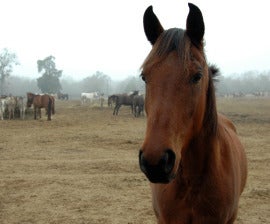-

Japan is one of the leading importers of both horsemeat and live horses for consumption. HSUS
Since 2009, Japan has imported almost 9,000 tons of horsemeat from North America, the majority of which originates from U.S. horses slaughtered in Canada. In addition, during the same period, nearly 15,000 live horses have been shipped to Japan from North America, making the long, often overcrowded flight under sedation only to be fattened up and ultimately slaughtered.
Horsemeat consumption in Japan
Japan remains one of the leading importers of both horsemeat and live horses for consumption. While some may argue that the consumption of horsemeat in Japan is a tradition, it was not until the post-war era that horses were ever raised for slaughter in the country, so this is a weak justification for killing and eating these beloved companion animals.
Consumer safety & drug residues
North American horsemeat also creates an unacceptable public health risk.
Horses in the U.S. are not raised for consumption, and virtually all U.S. horses slaughtered for human food start their lives as companion, working, or sport horses. Throughout their lives, these horses are routinely given a wide variety of veterinary drugs and other chemical substances that are known to be dangerous to humans if consumed, have not been tested on humans, and/or have been banned by the Food and Drug Administration for use in food producing animals.
There is no legal requirement in the U.S. for horse owners to maintain treatment records to show which of these substances have been administered, and when, to these horses over the course of their lifetimes.
Racehorses, many of whom are sent to slaughter when they are no longer deemed profitable, are sometimes given illegal drugs to enhance their performances, including cocaine and cobra venom. These substances can cause serious negative health impacts if ingested by humans. As such, The Humane Society of the United States, along with Front Range Equine Rescue, has petitioned both the United States Department of Agriculture and the Food and Drug Administration to classify all horses who were formerly companion animals, wild horses, or work and sport horses, and any other horses without a proven lifetime medical history as unqualified for use in the production of horsemeat for human consumption.
While about half of the veterinary pharmaceuticals commonly given to U.S. horses are prohibited in food products by the Japanese Ministry of Health and Public Welfare, the testing performed on imported products focuses on microbial and fungal pathogens and not on veterinary pharmaceuticals. Japanese consumers, therefore, are at risk.
What we’re doing
HSI is working with the Equine Protection Department of The Humane Society of the United States and our Canada and European Union offices to stop the slaughter of these beautiful and intelligent animals, reduce the international demand for horsemeat, and raise awareness of the serious health risks that horsemeat contaminated with veterinary pharmaceuticals poses to consumers in Japan and elsewhere.
